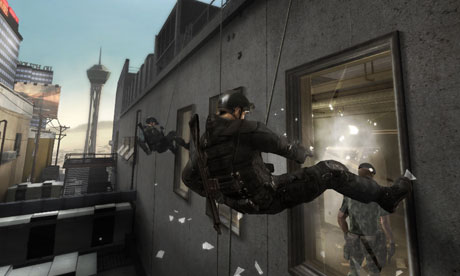
Tom Clancy, the author of blockbusting military thrillers who died on Tuesday aged 66, was kind of a big deal in video games. You wouldn't have discovered that from the Today programme's lengthy report this morning, or from most of the obituaries in Wednesday's newspapers. Naturally, as the writer of 28 blockbusting novels, the earliest of which were famously endorsed by Ronald Reagen, it is his literary output that most are recalling today.
But while his books sold somewhere in the region of either 50m or 100m copies (depending on your source), the games that bore his name passed the lower figure five years ago. To many 20- and 30-somethings, Clancy will be best known, not for gung-ho CIA thrill-fests like Patriot Games or Clear and Present Danger, but for Rainbow Six, Ghost Recon and Splinter Cell, shooters that licensed his name and also bought his tales of righteous super spies and despicable terror chiefs to interactive life.
There have been Tom Clancy branded games for 25 years. At first they were loosely affiliated submarine simulations, with early home computer titles based on the Hunt for the Red October and Red Storm Rising. But then in 1996 Clancy co-founded the development studio Red Storm with the intention of better exploring his established and future novels in the gaming realm. In this era, his input was more than simply licensing his credentials. According to designer Brian Upton, he took part in the original brainstorming session's for the developer's first title, Rainbow Six, as well as providing the designers with valuable military contacts, accrued through his year's of scrupulous research. As the game development progressed, he wrote the accompanying novel beside it.
Alongside the Illusion Softworks title Hidden & Dangerous, Rainbow Six effectively invented the tactical shooter genre – a more tense and authentic combat experience than the standard war blaster. Players had to command a small squad of counter-terrorist operatives, setting waypoints for their AI troopers and carefully planning attacks rather than barging in, sub-machine guns blasting. It was a huge success and would be followed by several sequels as well as an additional squad-based series, Ghost Recon, this time transferring the tense, strategy action into large battlefields with a more epic feel. It was the Ghost Recon titles, specifically the Advanced Warfare sub-series that briefly popularised intelligent co-operative military action on the home consoles.
I have never been tempted to pick up a Clancy novel, but I have played pretty much all the games with his name attached. Ubisoft was, I think, his perfect video game partner, able to extract the compelling elements of his novels – the technology, the military detail, the rollicking stories of espionage and intrigue – while reining in some of the patriotic excess. These games were rarely straightforward escapist action yarns, they brought grit and tactical depth, and they did so by utilising Clancy's idea of a world overrun by warring techno factions. Ghost Recon, Splinter Cell and Rainbow Six are not footnotes on an impressive career, they are highlights.
In 2002, Ubisoft published Tom Clancy's Splinter Cell, a stealth shooter featuring Sam Fisher, effectively Jack Ryan's more muscular younger brother. Clancy has little to do with the development beyond acting as an adviser, though, according to creative director Gregoire Gobbi, speaking to the BBC in 2002, the action was set squarely in Clancy's universe of high-tech weaponry and subterfuge. The author also lay down a series of strict rules for the team, including the assertion that civilians should never be killed – indeed the Splinter Cell series has always added a moral element to the slick action.
More recently, in the self-reflexive manner common to global entertainment franchises, we've seen the branding go full circle. There is now a range of novels based on the Splinter Cell and Endwar video games series – though none of them were written by Clancy himself. After signing a lucrative deal with Ubisoft in 2008 to license his name, his input seems to have been minimal.


Sign up for the Guardian Today
Our editors' picks for the day's top news and commentary delivered to your inbox each morning.
Sign up for the daily email
Source: Tablet Android
0 komentar "Tom Clancy – a video game maker too", Baca atau Masukkan Komentar
Posting Komentar